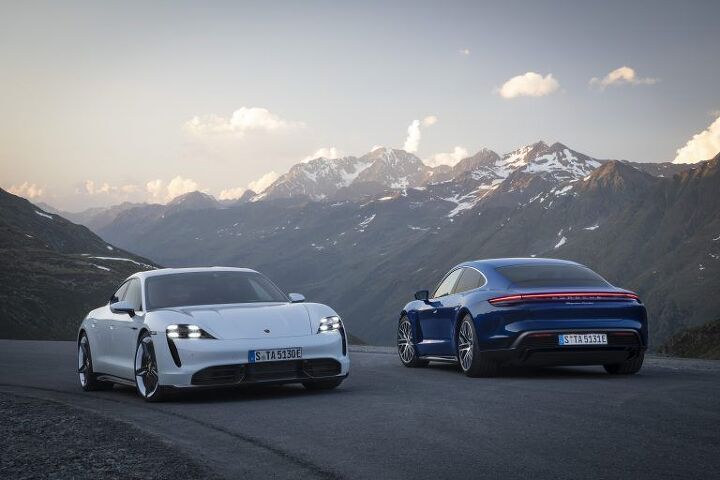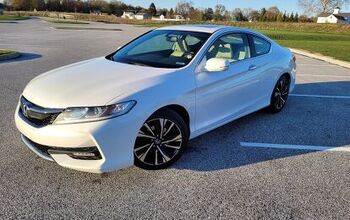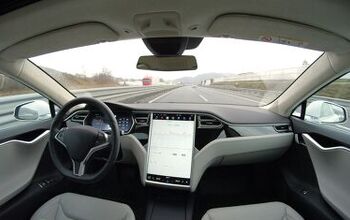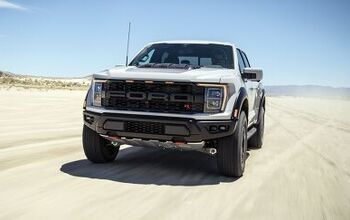Does Mileage Matter? Hottest Porsche Taycan's Range Revealed, Debate Ensues

As one would expect with an electric model, the first iterations of the Porsche Taycan revealed to the public were the high-performing Turbo and Turbo S variants. Hotter models land with a bigger splash (and earn their maker more money), so it was no surprise to see Porsche keep lowlier versions on the back burner. One surprise was the Turbo’s range: 201 miles, drawn from a 93.4 kWh battery pack. Hardly an industry-beating figure, especially for a six-figure car.
Now, the EPA has bestowed a rating on the Turbo’s more muscular sibling, the Turbo S. With an identical battery and extra oomph on tap — 750 horsepower — the Turbo S manages a 192-mile figure. Deal breaker, or irrelevant?
Sporting a duo of potent electric motors powering all four wheels and a 0-62 mph time of 2.8 seconds, the Turbo S is not your sister-in-law’s Leaf. While neither emit any CO2 from their non-existent tailpipes, the Porsche is, at its core, a refined driving machine that just happens to not pollute.
Performance, not efficiency, is Porsche’s topmost concern here, and that may be just fine with those willing to plunk down the necessary $187,000-plus for a Turbo S.
Yet range remains a selling point and a point of consternation for those who don’t have it. At roughly 5,200 pounds, the Taycan Turbo S is a hefty beast, outweighing most SUVs. Were that sizeable battery pack put to work maximizing range instead of feeding the hungriest of motors, Porsche might have a vehicle capable of challenging Tesla in the range wars, but it wouldn’t be much of a Porsche.
As it stands, the EPA rates the Turbo S at the equivalent of 68 mpg (MPGe). In contrast, the Tesla Model S Performance with its 100 kWh pack earns a 97 MPGe rating and goes the distance at 326 miles.
Environmentalists like to point out that smaller, lighter electric cars with just enough battery to handle day-to-day driving needs are the most efficient automotive solution to the climate issue, and they’re right. 192 miles is more then enough for even a lengthy commute. A robust recharging network and faster charge times would offset concerns of range, but that remains a work in progress. In the meantime, automakers continue chasing ever-higher range figures from ever-larger battery packs. And those packs are not the greenest thing out there.
As with traditional muscle cars, EV performance still demands the consumption of finite resources, just of a different kind.
[Images: Porsche AG]

More by Steph Willems
Latest Car Reviews
Read moreLatest Product Reviews
Read moreRecent Comments
- Billyboy The Big Three, or what used to be the Big Three, have been building sedans in the FWD unibody mold since the 80’s to compete with the Japanese - and failing. The Taurus was the only decent attempt, and even that fizzled out after a few years. Back to GM, There’s no reason to choose a Malibu over a Camry or Accord for normal buyers. The story was the same when it was the Citation, Celebrity, Lumina, and Impala, as it was the same with Ford and Chrysler. GM knows this, as does Ford, and doesn’t care - and rightfully so. Better to cede this time-worn commodity segment to others and focus to where the market has shifted.
- CanadaCraig You are not wrong. Or a dummy for that matter. I also think it's foolish of GM to kill off the Malibu. That said... I think there needs to be full-sized plain jane sedans for sale. And there are none. And haven't been for a long time. A basic BIG car. With room for six. Bench seat and all. Nothing fancy. And a low price to go along with it. I would buy one.
- OCcarguy Back in the 1980s the Mitsubishi Cordia was one of my favorite cars. I would love to see them make cars we could get excited about again.
- Chris I dislike SUVs. I think they are clunky looking and not much in the handling department. I'll take an Audi A4 or BMw three series or even a VW Jetta over any SUV. It I need more interior room for a shot time, I'll rent something bigger.
- Amwhalbi I have a sedan and an SUV, and for pure driving and riding enjoyment, I'll pick my sedan every time. But yes, SUV's are generally more practical for all around usage, particularly if you have only one vehicle. So I think the perfect answer is the sedan hatchback (a la the last Buick Regal) which can still yield the drive and ride or a sedan, yet provide a greater modicum of practical, accessible cargo capacity. Most of the sedans made could (with minor styling changes) easily become 4 door hatchbacks. Oh, yeah, I forgot - Americans don't like hatchbacks, even if they do in Europe...



































Comments
Join the conversation
So whose 2.0l does it use now? The article doesn't say. I'm glad it's not GM, but whose is it?
So long as there's no BEV tax incentive for this, who cares. But I bet there's a BEV tax incentive. Grrr.